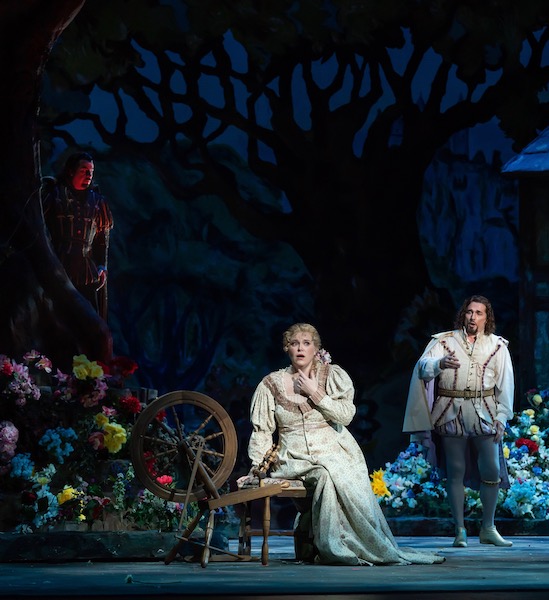Colorful staging lifts mixed vocalism in WNO’s “Faust”

Raymond Aceto, Erin Wall and Marcelo Puente star in Gounod’s “Faust” at Washington National Opera. Photo: Scott Suchman
This month Washington National Opera performs two operas it has not mounted in a quarter-century. After the opening of Tchaikovsky’s Eugene Onegin last week, it was the turn of Charles Gounod’s Faust Saturday night.
In contrast to the minimalist design for Onegin, Faust has a showy, stage-filling production—but unfortunately without the vocal casting to match. Even shorn of the ballet music the composer later added to the Act V, Saturday’s opener proved a long night in the theater.
Jules Barbier and Michel Carré based their libretto for this opera on the latter’s play adaptation of Part I of Goethe’s original. Faust, a scholar who has given his life to the pursuit of knowledge, strikes a deal with Méphistophélès, when the latter appears just at the moment he is about to commit suicide. In return for the devil’s services, to bring him youth and the conquest of a beautiful girl, Marguérite, Faust will serve Méphistophélès in hell.
Argentinian tenor Marcelo Puente made an uneven company debut in the demanding title role. He acted well, making a convincing transformation from old man to dashing youth in the first act. Yet he had a tendency to shout out dramatic moments in a sometimes raw fashion, with a chaotic vibrato toward the top. High notes, like the top C at the end of “Salut, demeure chaste et pure,” seemed at the edge of control.
As Marguérite, Erin Wall was generally the strongest in the cast. The Canadian soprano was entirely believable as the innocent maiden duped by the demon-assisted Faust, with a dulcet tone communicating virginal innocence. In the “Jewel Song,” the runs up to G sharp and A were secure, but she had a tough time holding onto the role’s high Bs, there and in her final scene.
Bass Raymond Aceto made a menacing Hunding in the WNO Ring Cycle. As Méphistophélès he was charming and diabolical, but lacking sufficient wattage in the higher notes of the role’s baritone side. Baritone Joshua Hopkins also disappointed, sounding vocally guarded in the role of Valentin, Marguérite’s protective brother.
Current and former members of the Domingo-Cafritz Young Artists program strengthened the lower end of the cast. As Dame Marthe, Deborah Nansteel deployed a powerhouse mezzo-soprano to provide solidity in the Act III quartet, also adding much-needed humor in her amorous pursuit of Méphistophélès. Mezzo-soprano Allegra De Vita added to her list of trouser-role accomplishments with an earnest and devoted Siébel, the youth who also courts Marguérite.
Conductor Keri-Lynn Wilson, last at the WNO podium for Turandot a decade ago, led the Kennedy Center Opera House Orchestra with a fairly sure hand; the large WNO Chorus occasionally got away from her, especially in transitions. The company and its orchestra continue to seem rudderless since the departure of music director Philippe Auguin.
The most pleasing part of the evening is the grandiose production from Houston Grand Opera, directed by Garnett Bruce and placed traditionally in the Renaissance. With sets and costumes designed by Texas painter Earl Staley, the staging is colorful and grand. A scrim features flames containing semi-hidden demonic faces, while painted backdrops give glimpses of cliff-seated castles in the distance and other vistas.
The crowd scenes are busy and pleasingly staged, with many details to occupy the eye, including a morality play at one point, featuring Adam and Eve tempted by the serpent in the Garden of Eden. Four tumblers enliven the student drinking scene in Act II, and the many magical demonstrations of the power of Méphistophélès are rendered well: a bright flash of light and smoke when he appears in Act I, the statue of Dionysus that spits out wine, and the breaking of Valentin’s sword, among others.
Faust runs through March 30. kennedy-center.org; 202-467-4600








Posted Mar 21, 2019 at 7:41 am by Cleofide
I am a supernumerary in the Washington National Opera production of Faust. I can’t say what Mr. Hopkins sounds like from the audience (because I’ve only heard him in rehearsal and either on the stage or offstage at the Kennedy Center). But I can say that it has given me a lot of pleasure to hear him sing in rehearsals and performances and I have commented over and over again to fellow supernumeraries “I really like him” or “I really like his voice.”